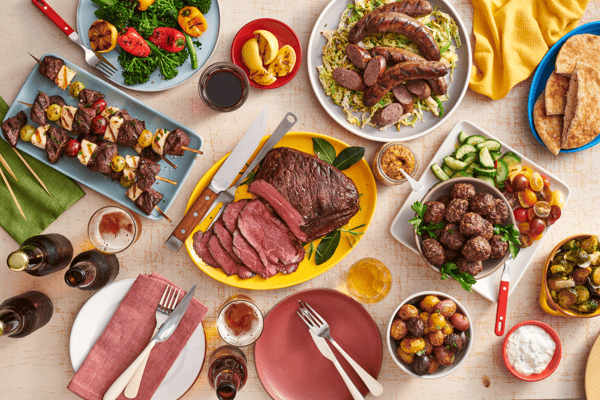
Shopping for beef online isn’t quite the same as it is at your local butcher shop or grocery store where you see the quality of the cuts up close! This is why product descriptions and pictures are so important. You need to know that when your steak shows up, you’re getting exactly what you were promised online.
But for some online beef sellers, those mouthwatering and meaty product descriptions can be less than accurate—or honest. Some sellers might compare their non-Wagyu products to Wagyu, boasting that their beef is “Wagyu-style” or even “Kobe-style.” Others don’t go that far but still claim that they have the highest-quality beef on the market without qualifying or explaining what that even means.
When shopping for meat online and comparing Wagyu to other beef, you’ve got to look beyond descriptions alone. Here are five differentiators that set Wagyu apart from the pack:
1. Look at lineage and how the cattle are raised.
Although Wagyu beef cattle can be born and raised anywhere, this breed can be classified as “fullblood Wagyu” only if genetic testing can prove purity of lineage and zero crossbreeding. This reality sets Wagyu apart from other breeds, like Angus, which can be designated “Angus” even if very little of the bloodline can be traced to its Scottish roots. Similarly, for example, beef from a Wagyu-Angus cross breed can be called Wagyu even if barely half of the genetics are Wagyu. This is also why designations like “Wagyu-style” simply don’t cut it.
On top of that, you need to know that your beef is coming from the best ranchers who have a humane and cow-loving culture. Yes, ranchers who respect their cattle have happier cattle, and the beef just tastes better. Ninety percent of U.S. Wagyu beef is graded prime by the USDA, so make sure you're shopping for Wagyu that is raised right to ensure you’re getting those prime cuts.
2. Make marbling a priority.
Marbling is tops when it comes to grading steaks, and we can’t get enough of beautifully marbled meat. If you’ve ever wondered what those bright white streaks or flecks of fat that run through (not around) a steak are, that’s marbling, and it gives beef a soft, flavorful texture.
Although some steaks, such as Angus, have a lot of marbling compared to lower-quality steaks, nothing compares to Wagyu marbling. Wagyu beef is known for its rich flavor and melt-in-your-mouth texture, and it’s largely thanks to the higher level of marbling in Wagyu cattle than in other breeds—it’s in their genes!

3. Know about the health benefits.
In addition to flavor and texture, Wagyu has a higher amount of monounsaturated fat, which not only can lower bad cholesterol levels but also can lower your risk of heart disease and stroke.
And that marbling we were just raving about? It’s what makes Wagyu rich in omega-3 and omega-6 fatty acids, which are essential fatty acids your body can’t produce. These health-boosting fatty acids can help protect your body against arthritis, depression, heart disease, high blood pressure, and even Alzheimer’s.
4. Don’t let the lingo overwhelm you.
There is a lot of lingo out there, and it’s helpful to have a handle on the language being used so you can shop smarter. For example, a lot of online beef sellers base their offerings around the USDA’s three highest grading levels (in descending order):
-
Prime
-
Choice
-
Select
Roughly 5 percent of U.S. beef is graded as prime, but keep in mind that Wagyu’s quality goes above and beyond, with fullblood Wagyu having marbling that’s two to five times that of prime beef. Speaking of “fullblood Wagyu,” it’s important to know what differentiates it from “purebred Wagyu.”
Genetically speaking, purebred Wagyu must be 93.75 percent Wagyu, but use of the “purebred” designation often leads people to believe they’re getting 100 percent Wagyu. If you want 100 percent Wagyu, then you’re going to want to look for a seller who can guarantee verification as “fullblood Wagyu.”
5. See what people are saying about the seller.
Even if you live close enough to visit a ranch that sells Wagyu, meet its owner, and see its operations in person, you’re probably still going to make the decision on where to shop based on reviews or word of mouth.
Spend plenty of time reading online reviews, checking out social media posts, and looking at comments from other buyers to see how different purveyors of beef stack up against one another. Then, once you move from master steak researcher to Wagyu-loving customer, make sure you leave reviews to help other shoppers.
Happy beef hunting!
Remember to look beyond the words and pictures to get to the meat of what you’re buying, pun intended. (You’re welcome.)
At Lone Mountain, we’re dedicated to all of these principles—great herd management, total transparency, excitement about the health benefits of our beef, and cultivating a top reputation—because we know that there are plenty of differences in beef sellers online and that where you buy matters just as much as what you buy.





